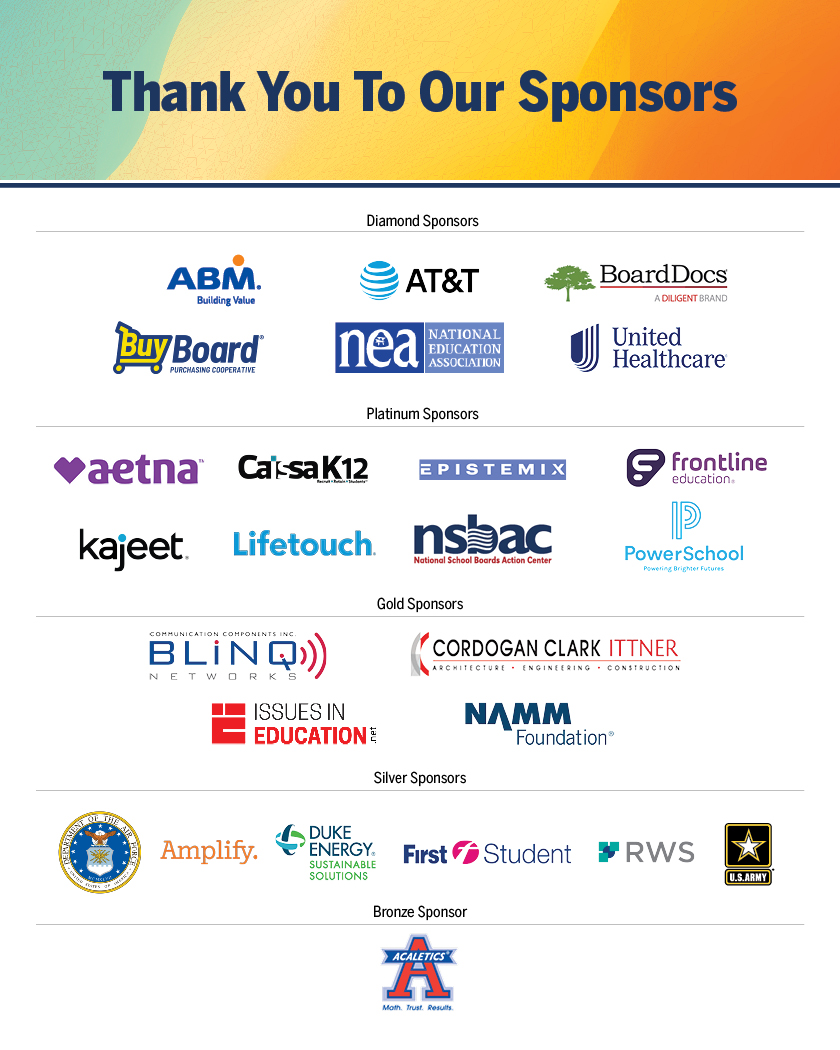Attention Conference Attendees!





The NSBA 2022 Annual Conference and Exposition is the one national event that brings together education leaders to learn about best governance practices, gain insight into child development and learn about new programs and technology that can help enrich student learning. NSBA 2022 is one of the few—if not the only—places where school board members from around the country can receive the training necessary to address the instructional needs of students and to improve the efficiency of district operations.
| Registration | Registration Deadline | NATCON/CUBE/State Association Delegates | Member State Association | Non-Member State Association | Spouse |
| Standard | March 31 | $800 | $950 | $1,450 | $100 |
| Onsite | April 1-4 | $1,100 | $1,100 | $1,600 | $100 |
| NATCON/CUBE/State Association Delegates | General |
| $450 | $550 |
| NATCON/CUBE/State Association Delegates | General |
| $350 | $450 |
Cancellations and refunds for registration will be accepted until February 18, 2022, with a full refund, less a $150 processing fee.
Registration cancellations received on or after February 19, 2022, will not be refunded. No-shows will not receive a refund.
All cancellation requests must be submitted in writing via the NSBA Registration & Hotel Support Center or via Fax: (415) 216-2535. Refunds will be processed within one week of the request. NSBA is not responsible for airfare, hotel, or other costs incurred by participants in the event of program or registration cancellation.
| 7 a.m. – 5 p.m. | Registration |
| 8 a.m. – 5 p.m. | Experiential Learning Visits |
| 9 a.m. – 4:30 p.m. | Preconference Workshops |
| 7:30 a.m. – 5 p.m. | Registration |
| 9 –10 a.m. | Concurrent Sessions |
| 10:30 a.m. – Noon | General Session |
| Noon – 5 p.m. | Exhibit Hall |
| Noon – 5 p.m. | NSBA Cares Community Service Project |
| 12:15 – 3:15 p.m. | Study Hall Sessions (Exhibit Hall) |
| 12:30 – 2 p.m. | Council of Urban Boards of Education Luncheon & National Hispanic Council Luncheon |
| 1 – 2 p.m. | Concurrent Sessions |
| 3 – 4 p.m. | Concurrent Sessions |
| 7:30 a.m. – 5 p.m. | Registration |
| 8 – 9:30 a.m. | Native American/Alaska Native Council Breakfast |
| 8:30 – 9:30 a.m. | Concurrent Sessions |
| 10:30 a.m. – Noon | General Session |
| Noon – 5 p.m. | Exhibit Hall |
| Noon – 5 p.m. | NSBA Cares Community Service Project |
| 12:15 – 3:30 p.m. | Study Hall Sessions (Exhibit Hall) |
| 12:30 – 2 p.m. | National Black Council Luncheon |
| 1 – 2 p.m. | Concurrent Sessions |
| 3 – 4 p.m. | Concurrent Sessions |
| 7:30 a.m. – Noon | Registration |
| 8 – 9 a.m. | Concurrent Sessions |
| 9:15 – 10:15 a.m. | Concurrent Sessions |
| 10:30 a.m. – Noon | General Session |
Arrive early and attend a preconference workshop on Friday, April 1. All preconference workshops are ticketed events. They are open to all conference registrants, and tickets must be purchased in advance. The capacity limit is 120–Register early to secure your spot.
Preconference #1: Leading for the Future: Connecting Future Thinking to Change in the Present
We all make assumptions about what the future will be like. Often without realizing it, we assume it will unfold in a predictable and linear way. By doing that, we limit our creative and innovative leadership capacity. Futures thinking enables us to examine our assumptions about the future and better understand how the changes that are happening today could affect our communities years from now. Join us to learn to use futures thinking tools, a thought network framework for relationship building, and policy advocacy tools to pursue your vision for the future of education.
CUBE/NATCON: $290 | REGULAR: $345
Preconference #2: Strategic Talent Leadership: The Silver Bullet of School Improvement Strategies
Districts allocate 83% of their budget towards personnel. Teachers and principals have the largest impact on academic outcomes compared to ALL other factors, driving 58% of the variance in student achievement. Effective leaders understand that sustainable school improvement can ONLY occur when a strong talent leadership strategy is in place. Participants will receive interactive training and a resource book containing the tools to: (1) assess current talent leadership practices, (2) create a talent leadership action plan, and (3) track progress towards improved student outcomes. Book included.
CUBE/NATCON: $310 | REGULAR: $355
Preconference #3: Keeping Students Safe Every Day: A Practical Guide to Safer Schools
Every child deserves to learn in a safe and supportive school environment. As schools emerge from the challenges of the pandemic, it’s more critical than ever to refocus on school safety. Yet, these conversations often fall short as they are heavily law-enforcement focused, political, or impractical to the realities of schools in a post-pandemic world. Board members and other educational leaders are uniquely positioned to be important catalysts for systemic improvement. This interactive and engaging workshop features an education-based examination of current concerns related to an all-hazards approach to safety, crisis response, and violence prevention combined with practical, low-cost strategies that can be effectively implemented throughout school districts.
CUBE/NATCON: $290 | REGULAR: $345
Preconference #4: Becoming More Engaged & Inclusive Educational Leaders: Strategies for Supporting Our LGBTQ Students
Given the importance and impact that diversity and equity issues play in the lives of students, it is imperative that school boards are prepared to meet the needs of diverse learners, such as LGBTQ students. There are key considerations for effectively supporting LGBTQ students that educators must be aware of. This preconference workshop features a highly customizable and interactive diversity and equity training that helps educators and school board members develop the competency necessary to support LGBTQ students.
CUBE/NATCON: $200 | REGULAR: $225
Preconference #5: Redefining Student Success
There is no topic currently more relevant to school districts and their school boards than rethinking the purposes and outcomes of K-12 education. The COVID-19 pandemic laid bare the frailties of the current system when it is based primarily on memorization and compliance and when access to technology and other resources is not equitable. In the post-COVID world, how do you help your district assemble and implement a coherent new set of outcomes for your 21st-century students that reflects your community values? This interactive workshop will help you take on this important challenge. Book included.
CUBE/NATCON: $220 | REGULAR: $245
Preconference #6: If You Don't Know Where You're Going, How Do You Know if You Got There?
If you don’t know where you’re going, how do you know if you’re on the right path or if you’ve arrived? Learn how the Association of Alaska School Boards helps districts develop a strategic plan, set a vision and mission for the district, examine data, and monitor progress to ensure time and resources are focused on student achievement and moving the district forward. Attendees will identify ways they can apply lessons learned in their own district's strategic planning process.
CUBE/NATCON: $200 | REGULAR: $225
Preconference #7: Understanding the Key Work of School Boards
In today’s high-stakes educational environment, the daily pressure on governance leaders is enormous. The more effective the board, the better a school district’s students perform. The Key Works of School Boards provides a framework that reflects “best governance practices” that are traceable to high-performing boards and high-performing school districts. This session provides an overview of a relevant and reliable governance guide with strategies and ideas that reflect board best practices. You’ll explore the five Key Work action areas. Book included.
CUBE/NATCON: $220 | REGULAR: $245
Experiential learning visits offer a rare opportunity to explore education in practice. Click below to learn more about each visit scheduled for Friday, April 1.
Creating Cultures of Innovation in Your School and District
Experience the latest in education innovation and EdTech by engaging in hands-on learning at The Jacobs Institute for Innovation in Education at the University of San Diego. Throughout the day, participants will explore our Innovation Lab and experience creative ways to integrate emerging educational trends such as:
Join us to network and get new ideas on how to build a culture of innovation in your school or district. Lunch included.
Participants should check in by 8:45 a.m. Buses will depart promptly at 9 a.m. from the San Diego Convention Center. The registration cut-off date is Feb. 28, 2022. There will be no on-site registration.
Price: $200 | Capacity Limit: 100
Empowering Students for Life Beyond the Classroom: Student Success in Action at Cajon Valley Union School District
The Cajon Valley Union School District (CVUSD) is pleased to host education leaders for school site visits at multiple school sites. CVUSD is a public school district of 28 schools with 16,000 students and has been advancing 1:1 technology for eight years across all grades. The district serves a wide geographic footprint of 66.3 square miles, located 15 miles east of downtown San Diego. Cajon serves a diverse community of learners, with 71% of CVUSD students eligible for free and reduced-price lunch, learning to speak English, or in the foster care system.
Join the superintendent, board members, staff, and students to learn about the development and implementation of the modern curriculum. Hear how the district is integrating informal learning, career development, social and emotional learning, family, and community engagement, and blended and personalized learning to accomplish the district vision of developing happy kids who are engaged in healthy relationships and on a path to gainful employment.
Participants should check in by 8 a.m. Buses will depart promptly at 8:20 a.m. from the San Diego Convention Center. The registration cut-off date is Feb. 28, 2022. There will be no on-site registration.
Price: $200 | Capacity Limit: 100
A Career Development Approach to Advancing Literacy Growth
COVID has amplified the need for new models of career development to overcome the factors that lead to unemployment. One such factor is poor literacy skills. In the U.S., nearly 44 million adults are functionally illiterate, lacking basic skills beyond a fourth-grade level. One new approach designed and integrated by Cajon Valley Union School District (CA) leverages a blended learning model and the use of modern technology to integrate literacy and career development that is leading to measurable career and Lexile growth by students.
Being 4 today! It’s Not Like Your School Experience!
The Pewaukee School District (WI) (enrollment 3,000) reimagined early learning through an immersive 4-year-old kindergarten experience. This model provides play-based learning using science and social studies themes, with deep infusion of literacy and numeracy. Students learn in each of 12 classroom experiences throughout the year. Since implementation, academic and social-emotional skill development have soared. Learn how classrooms can be physically transformed into a museum-like environment that is fiscally sustainable and yields positive learning outcomes.
Bridging the Opportunity Gap: Career Pathways Resulting in Guaranteed Jobs for Students
Discover how Lenoir County Public Schools (NC) (enrollment 8,300) formed innovative partnerships with the local manufacturing community to expand work-based learning experiences for students to include paid youth apprenticeship positions while in high school and guaranteed jobs after graduation. LCPS is piloting cutting edge, first-of-its kind internships, youth apprenticeships, and apprenticeship programs in partnership with Spirit Aerosystems, Crown Equipment Corporation, the North Carolina Masonry Association, and Lenoir Community College.
Click Here: How Digital Resources Help Students, Teachers, and the Bottom Line
The Oklahoma Library of Digital Resources is brought to you by the Oklahoma State School Boards Association in collaboration with Oklahoma teachers. It can help transform the classroom and engage students with free, high-quality digital resources. The library includes more than 5,000 resources curated by Oklahoma teachers that supports academic standards. Participants will be engaged with new technology and will learn a process to duplicate this resource in their state organization when they return home.
Collaboration: The Key to a School District's Success
Representatives from the Adams 12 Five Star School District (CO)will describe how collaboration across many stakeholder groups has led to success in a variety of goals including increased student achievement, cohesive employee group contract negotiations, and successful mill and bond proposals. The increased student achievement is demonstrated in improved assessment data and increased graduation rates.
College Academy: Earning an Associate Degree Without Losing the High School Experience
How can students earn an associate degree without losing the memorable experiences of high school? In this session, you will learn how Cypress¬-Fairbanks ISD, the third largest district in Texas, piloted the College Academy at one of the high schools and has now expanded the program to all its high schools. The College Academy, a program within a high school, is designed for students to be able to enjoy and participate in extracurricular activities, clubs, and other experiences unique to high school while earning an associate degree.
Empowering Excellence and Success through Student Leadership
The Pendergast Eighth Grade Superintendent's Student Council builds strong connections to schools and the district. Student members strive to be influential leaders and play an integral role in spreading positive messages about Pendergast Elementary School District (AZ). The goal of the council is to prepare for the future and learn about opportunities available beyond high school. The students also gain leadership, presentation, and teamwork skills. Session participants will learn how to build leadership capacity in students so they can engage in governance while working closely with the governing board and superintendent.
Ensuring All Students Achieve: Tips for Board Action and Accountability
If you ever tried on a "one-size-fits-all" shirt you probably already know the issue with this approach. At best, the shirt will fit most people, albeit not well, and at worse it won’t fit at all. When we apply the "one-size" approach in education, some students inevitably get left out.
What can we do to ensure all means all? In this session, school board members and state association trainers Nikkie Whaley and Julie Bacon will discuss what role school boards play in student achievement and how they can improve outcomes systems-wide.
Fostering Resilience Through Student Service Initiatives in a Post-Pandemic Era
The Lincoln Intermediate Unit (PA) has implemented strategic student programming designed to effectively and comprehensively respond to concerns brought about by the pandemic. At the LIU, Dr. Laura Sharp impacted the way it handles student services, and plans to bring this experience to Southwestern School District. School entities may need to revisit infrastructure/policy considering the pandemic’s direct impact on student mental health. This session will use a trauma-informed framework to develop and integrate restorative approaches to enhance school climate in a post-pandemic era.
How to Talk to Your Community about Student Achievement and Accountability
This session provides inspiration and tools to support your important work of redefining student success through conversations with your community. School board President Ty Liddell and Superintendent Mike McCormick from the Val Verde School District (CA) describe how they are navigating these community conversations and putting students on new pathways for their future. To support your work, Ken Kay and Suzie Boss will help you to engage with two critical audiences: students and parents. Each participant will receive the Student and Parent Guides to 21st Century Learning.
Insight into Career Immersion & Mentoring
The Pewaukee School District (WI) has opened doors to the community through Pewaukee High School’s Insight program. Designed to give students hands-on, real-world experiences while immersed in a professional setting, students engage in personalized mentoring with a business professional, industry certification, post-secondary credit opportunities, cross-curricular co-teaching, and career immersion through business partnerships. For the past six years, Insight has been building the next generation of professionals while simultaneously supporting the needs of our labor market.
Leveling Up in a Rural Community: Learning for All to Bridge the Equity Gap
Attendees will leave energized and ready to raise expectations for teaching and learning in their districts no matter their struggles. Lenoir County Public Schools serves 8,300 students in rural Eastern North Carolina. In six years, LCPS has gone from the only low-performing district in the region to celebrating two outstanding district accreditations - the most recently with Cognia in March2021 with a nearly perfect score! Learn how you can bridge your equity gap with powerful strategies for school improvement and Level Up Learning for All in your hometown.
Super Kids Super Ready
The Educational Team, including teachers, administrators, and board members, from Hamilton Local Preschool will outline how the school district established, implemented, and continues to support a strong academic preschool. Hamilton Local Preschool infuses academics, social emotional learning, and literacy enrichment lessons that earned a 5 Star Rating from the Ohio Department of Education and the Ohio Department of Jobs and Family Services. Come and learn how you can enhance your program or start a new one! Our kids are ready to learn!
Using School Climate Data to Improve Schools
No matter where learning takes place, students, staff, and families feeling safe, engaged, and connected at school is essential for students to learn and for staff to create positive conditions for learning. Learn how Alaska school districts are measuring school climate through the Alaska School Climate & Connectedness Survey. Discover how the survey is a tool to improve and strengthen school environments and relationships and explore the school boards' role in supporting positive school climate.
Using the Portrait of a Graduate for District Transformation
Hundreds of districts nationwide have engaged their communities in developing a Portrait of a Graduate to redefine student success. Learn how two districts – Val Verde Unified School District (CA) and Fallbrook Union Elementary School District (CA) are transforming their systems through this approach. Participants will learn how superintendents and school boards work together with their communities to create their Portrait of a Graduate and use it as a lever to equitably transform student learning.
You must be registered for the conference before you can reserve housing. All reservations should be made prior to March 18, 2022. Room availability and conference rates cannot be guaranteed after this date.
Most of the official hotels are in walking distance to the San Diego Convention Center (SDCC), the primary meeting venue. NSBA will provide complimentary shuttle bus service between the convention center and official hotels that are not within walking distance. Click here for shuttle schedule.
The SDCC sits just outside the city’s Gaslamp Quarter. This urban playground is home to a range of dining, shopping, and entertainment offerings. Also nearby is the Embarcadero, which is ideal for walks along the bay and enjoying several grassy parks.
The MTS Trolley: Has two stops in front of the convention center and is a convenient public transportation option for exploring Little Italy, Old Town, Fashion Valley and more. All riders age five and older must pay with the PRONTO Card. For where to buy the card, trolley schedules, and trip planner tools go to the MTS website.
FRED (Free Ride Everywhere Downtown): Completely free service that works through a mobile app. Visit the FRED website for the hours of operation and connection stops for these electric, open-air vehicles.
Dockless, Motorized Scooters & Bicycles: The City of San Diego has partnered with a select number of companies to provide shared mobility devices for rent. Information on the authorized partners is available on the SanDiego.gov website.
Guest Services in each hotel and the convention center will assist with securing taxi service. Multiple rideshare companies, including Lyft and Uber, operate in San Diego. Access your preferred provider through their mobile app.
For attendees with automobile access, an underground parking garage is below the convention center. It has capacity for 1,950 vehicles, including 31 ADA-compliant parking stalls. Entrance to the parking garage is on Harbor Drive. There are no in-and-out privileges and overnight and RV parking are not permitted.
Parking rates range between $15-$35 (subject to change) and payment is due upon entry. Questions regarding the SDCC parking garage should be directed to ACE Parking at 619.237.0399.
Off-site parking is available at numerous nearby parking lots and garages in downtown San Diego, and many are within walking distance of the convention center.
Metered street parking is available in some areas. Parking meters are enforced Monday through Saturday, from 8 a.m. until 6 p.m., unless otherwise posted. Metered spots are free on Sunday and designated holidays. Meters accept nickels, dimes, quarters, and prepaid electronic debit cards.
To mitigate risk of infection during the in-person event, our safety team is planning a range of measures such as contactless registration, physical distancing, face coverings, regular cleaning, designated entrances and exits, and seating limitations in meeting rooms. We will also promote good hygiene practices such as frequent handwashing and use of hand sanitizer.
Conference participants are required to show proof of full vaccination or confirmation of a negative COVID test. Testing must be conducted within one day for an antigen test and two days for a PCR test. Here are the step-by-step instructions for uploading your proof of vaccination or negative test results:
For more information, watch the tutorial or read the FAQs. 42Chat HealthShield will be available on Monday, March 14. As an additional safety measure, participants are strongly encouraged to wear a mask indoors regardless of vaccination status, except when actively eating or drinking.
